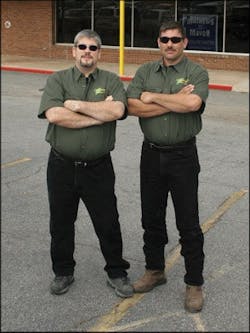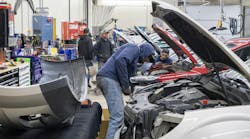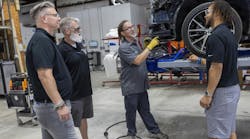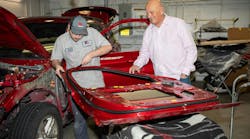Tracking CrashMaster Collision’s Eco-Friendly Payoff
One of the darker sides of collision repair? This business can be really, really bad for your health.
Keith Meisner and Rich Sargo, co-owners of the Atlanta area’s CrashMaster Collision Repair, have been around autobody shops for enough years to see—and experience—the ugly effects of environmental contaminants that come with the repair territory. Meisner’s grandfather—who built his shops from the ground up back when “state-of-the-art safety was putting a paper mask or a T-shirt over your face”—suffered neurological problems, and long-term exposure to conventional solvent-based paints caused Sargo’s father to suffer respiratory duress. Meisner and Sargo themselves have occasional muscle twitches and tremors that they attribute to years of paint fumes and Bondo dust.
So when Meisner and Sargo pulled up at what would later become CrashMaster Collision Center to scope out the struggling Kennesaw, Ga., shop they intended to buy, they noticed two things right away: the strong odor of paint and the childcare center that backed up to the property. That alarming juxtaposition solidified their interest in doing something different with their new business venture. That something different would be something green.
PERSONAL HEALTH, PLANETARY HEALTH
These days, it’s nearly impossible to ignore media coverage of the environment: polluted air, contaminated groundwater, overwhelming amounts of garbage, to say nothing of climate change. Thanks to recent coverage in mainstream magazines like Vanity Fair and Newsweek, television programs like “The Green” on the Sundance channel, and Web sites like Treehugger.com, Grist.org, and IdealBite.com, there’s also a fast-growing awareness of the link between planetary health and personal health. When one suffers, so does the other.
Auto-related businesses are among the most prominent companies taking action to improve the health of the planet. Toyota and Honda are leaders in reducing auto emissions and increasing fuel efficiency with their hybrid and electric technologies. BP is engineering biofuels. And companies like BASF and PPG Industries, to name just two of many, are moving forward with waterborne primers, paints and clearcoats.
Increasingly, corporations are taking it upon themselves to reduce their carbon footprint—that is, the amount of fossil fuels they burn—and to reduce their contribution to air pollution. Some states are getting in on the action, too. California, for one, has mandated a reduction in pollution-producing volatile organic compounds (VOCs) found in products like solvent-based paints.
Other states are poised to follow suit. Georgia, isn’t among them, but for Meisner and Sargo, their decision to go green was a personal one. “I don’t want to be like my grandfather,” says Meisner, who attributes his grandfather’s death to the long-term health effects of those nasty paint fumes. “Rich and I plan to be here a long time.”
GREEN BUSINESS IS GOOD BUSINESS
With all due respect, there’s a fair chance that the guys at CrashMaster might repair cars faster than you do, better than you do and maybe even cheaper than you do. If so, they say, that’s because they’re greener than you.
While Meisner and Sargo do have the chops to run a good shop—more than 25 years apiece in the biz—they’d just be boasting if their claims weren’t backed by the jobbers and insurance companies they work with. According to one jobber’s index for expenses related to repairs, CrashMaster spent just 50 percent of what conventional shops had to cough up. And in a recent meeting with an insurance company, Meisner says, “Our data showed that we have a faster turnaround time, lower cost of estimate, and lower cost of rental cars than other shops in this area.”
CrashMaster attributes its star performance to less waste—less time wasted, less money wasted, fewer resources wasted—because they’ve aggressively pursued efficiency. Here’s how Meisner and Sargo have improved their shop, with both common-sense conservation and technology-driven innovation: They use waterborne no-VOC basecoat and low-VOC clears from BASF subsidiary Glasurit. They use reconditioned bumper covers and other Like Kind Quality parts for aesthetic repairs. They recycle auto materials like oil, antifreeze, refrigerant, waste paint, sheet metal, batteries, and repairable plastics. They rely on biodegradable, nonphosphate soap for washing repaired cars. They work with management system software that generates less paper in the office. They have a recycle bin in the office for paper and cardboard. They use recycled, reusable ink cartridges for the office printer. They stock the bathroom with Method hand soap, which is biodegradable and packaged in a recyclable container. And they use low-wattage, compact fluorescent lightbulbs.
The most sophisticated—and costly—eco-friendly move that CrashMaster has made, however, is on the paint line. With the help of Glasurit representative Scott Krause, Meisner and Sargo set up the first waterborne paint system in Georgia, reducing their exposure to the solvent-based paints that plagued older generations in their family. The switch also means they use less paint and create less waste.
Downdraft spray booths with filtration systems capture would-be air-polluting particulates, and high-volume, low-pressure spray guns ensure that the paint is applied as efficiently as possible.
“By using a computerized, waterborne system, we only mix what we need to apply,” Meisner explains. Where waste from conventional paint fills a 55-gallon drum about every three months, CrashMaster has yet to hit the drum’s halfway mark after six months of working with waterborne products.
THE GREEN BEHIND THE GREEN
Going green hasn’t been cheap, but Meisner and Sargo were always prepared to part with some cash to update the 22-year-old business they were buying. Still, Meisner’s estimate that they invested “seven kids’ college funds” on the project was more than they’d planned to spend. “We didn’t start off with a shoestring budget, but we’re running one now,” he quips. Big-ticket items included the shop’s vacuum system and the eco-conscious paint system.
But, Sargo says, “You can’t put a price tag on better health for you and your employees, and for being around for your kids for an extra 10 or 15 years.”
While the CrashMaster co-owners are cautious about setting ROI expectations for their green ambitions, they do carefully track the numbers. Referencing a couple of decades of data from former CrashMaster owner Wally Zimmerman, Sargo reports the new business has lower monthly spending and about a 65 percent increase in the number of repairs and sales.
Figures from “The Smog State” show why green makes sense
California, which has the worst air pollution in the nation, has mandated some eco-friendly changes for autobody shops, and Canada is set to follow suit in 2009.
Conventional solvent-based paint gives off volatile organic compounds (VOCs) associated with neurological disorders, respiratory problems, smog and a long list of other health and environmental woes. California is requiring a reduction in air pollutants, and paint vendors have responded by creating waterborne products that deliver three pounds per gallon fewer VOCs. Might not sound like much, but when you consider that an average-sized collision repair shop sprays more than 100 gallons of paint per year, thereby cutting VOCs by 300 pounds, it starts to add up. In fact, saving those 300 pounds is the antipollution equivalent of taking 1,000 new cars off the road each year. Per shop.
In August, PPG Segment Manager for Compliant and Value Collision Doug Beuke helped 100 shops make the transition to waterborne basecoats like PPG’s Envirobase High Performance and Nexa’s Aquabase Plus. By September 2008, another 1,500 shops in California will make the transition.
Beuke reports that training a shop to use the new technology takes only about a week. “Everyone is very apprehensive to move away from technology they’ve been using for 20 years, especially because the paint piece is such a huge part of the business,” Beuke says. “But most of our customers are saying, ‘Wow, this is excellent and we should have done this a long time ago.’”
PPG, like many paint vendors, is focusing training and sales efforts first on markets where compliance has been mandated or seems to be imminent. For shop owners who want to check into waterborne options before their state takes action, Beuke suggests first talking with your waste services provider: Waterborne products require a separate waste stream from conventional solvent-based products, and handling that second waste stream carries an additional cost.
“Taking care of the environment is a good thing for all of us to do,” Beuke adds. “If there’s no reason not to, why wouldn’t you?”
Coming in to CrashMaster, the new owners evaluated everything from the waiting area to supplier relationships. They gutted the shop, repainted and reorganized to increase efficiency and to reduce waste throughout. When the remodeling was done, CrashMaster’s 12,000 square feet included three frame bays, two downdraft spray booths, an aluminum clean room, compression resistance welding, plastic welding and repair, a laser measuring system and automotive diagnostic equipment. Then Meisner and Sargo rolled out their green processes.
“Some employees took to the new processes; some took new jobs,” Meisner says. “We brought in technicians who, when grinding, actually wore goggles, and when applying Bondo, actually wore gloves.”
The result is that workers’ health is protected, and workers comp costs are down. “We don’t have as many people calling in sick,” says Meisner, who suffered asthma attacks and sinus issues while growing up in the business.
MARKETING AND LIVING THE MINDSET
The shop’s marketing has included a few press release_notess, some ads in the local paper and some news articles they’ve written about the benefits of an eco-friendly auto repair shop to the community. Emails from Meisner include the tagline, “Your Eco-Friendly Collision Repair Facility.” But not a lot of folks are walking through the door simply because CrashMaster is green.
“I hate to say it,” Meisner laments, “but a lot of customers ask, ‘What’s eco-friendly?’” Some are intrigued by the concept, but are ultimately more appreciative of the shop’s commitment to quality work. Women, in particular, seem to appreciate the brighter, better-organized shop—and with women most often being the arbiters of their families’ health, the shop’s eco-friendly qualities are likely to gain more traction.
HOW GREEN CAN YOU GET?
Meisner is aware of the golden opportunity he and Sargo had to green CrashMaster. Since they were planning to gut the place as part of the purchase anyway, the only cost directly associated with the eco-focus was paying for the nonstandard equipment and processes they put in place.
For a shop that’s up and running, Meisner acknowledges, the costs could be steep if you aren’t already planning to make some major changes. In fact, before investing a ton of cash into eco-friendly changes, it might be wise to start small. From an environmental perspective, Sargo points out, every little bit helps. Begin with recycling paper in the office, for example. Work your way up to separating out and recycling the paper that’s pulled off a vehicle being painted.
From there, you’ll begin to develop an eye for reducing waste and increasing efficiency—and that, obviously, can benefit your bottom line as much as it does the planet. For instance, Meisner recommends that you check for leaks in your air compressor line. Repairing leaks will reduce your demand for energy (good for the environment) and reduce the cost of your electric bill (good for your business). Another easy fix: Reduce the number of light bulbs in waiting room, bathroom and office fixtures from, say, four bulbs to two. Many energy companies offer an energy audit that identifies your opportunities to reduce your energy consumption, and by extension, your monthly bill.
Aside from seeing more autobody shops do their part for the environment, Meisner and Sargo wish other, related businesses in the industry would step up, too. For instance, CrashMaster could collect the dust that comes from using body filler—if the manufacturer could come up with an eco-friendly way for them to recycle it. Insurers could help make the industry more eco-friendly by covering the higher cost of repairs done green, such as those waterborne paint jobs, which most in the industry expect will one day be the required standard. Insurers could also offer their customers—especially those who drive hybrids—a list of green shops.
“You’d think an eco-friendly insurance company, for example, would want to work with an eco-friendly shop,” Meisner says, “but it’s been like pulling teeth to get in the door with them.”
ECO-FRIENDLY AMBITION
At CrashMaster, Meisner and Sargo are still on the lookout for more ways to green the business. “In the next year or two, we’d like to get solar power in the shop—at least enough to run the lights,” Sargo says. He and Meisner have been trying to tap into outside resources, such as working with the Environmental Protection Agency, to help minimize the expense of a solar move.
Chances are, even if the pair can’t find an outside source to help pay for solar, they’ll likely install it anyway. Meisner and Sargo greened their shop first and foremost because they believe in the importance of making the planet a healthier place to live. The fact that eco-friendly business happens to be good business is, they hope, their good fortune, and they plan to add new locations in the near future. Nothing would please them more than to see other shops following suit with a green focus.
“Growing up in this business, being self-employed almost my whole life, I’m out to make a living, not just a paycheck,” Sargo says, explaining his and Meisner’s dedication to making CrashMaster a green business. “Besides, I’d like to be known in this industry for something other than being able to fix a mean dent.”



